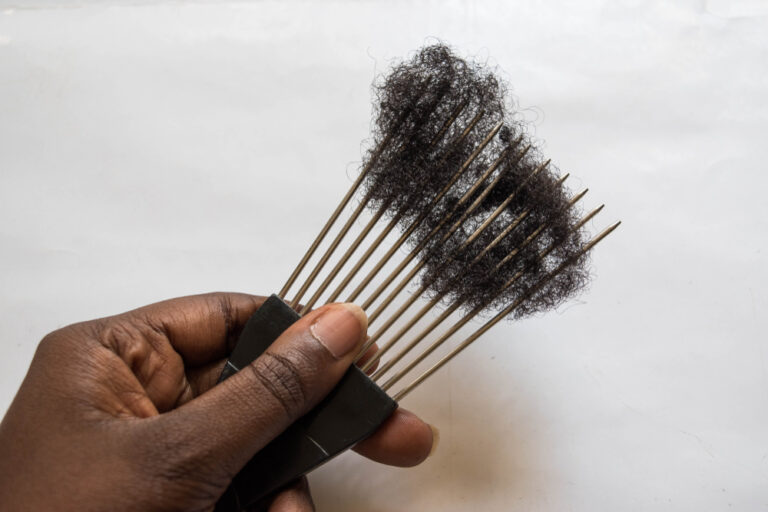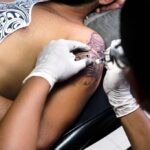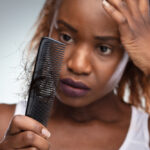Hair breakage usually occurs when the overlapping scales in our hair, which hold the hair strands, become weak. Hair breakage is not the same as hair loss or hair fall. Hair loss or hair fall is the concept explaining shedding of long hairs from their root, while hair breakage explains the ‘breakage’ of hair from the hair shaft.
For a person to know for sure if they have a case of hair breakage, they have to answer the following questions:
- Does the hair on my head have split ends?
- Does my hair feel brittle when I run my fingers through it?
- How easily does my hair tangle; very easy?
- Does my hair have fall outs; are there short and broken pieces?
- Does my hair appear too dry?
If your answer to one or more of the questions above is in the affirmative, then you may have breakage issues.
Hair breakage is caused by a host of reason. The ten most probable cause of hair breakage include:
- Dryness in hair: Dry hair is often caused by dry weather and low humidity, and these are harbingers of hair breakage.
- Excess chemical additions: The excessive use of relaxers, straighteners, hair dyes and many other chemical substances can lead to the breakdown of the hair cuticle, and subsequent hair breakage. For this reason, dermatologists recommend hair relaxing sessions to be at least 2 months apart.
- Over-washing: The oil produced in the scalp, known as sebum, is a protective substance. When the hair is washed too often, this protective oil is removed and the removal leaves the hair susceptible to breakage and general damage.
- Elastic head ties: Elastic head ties, which are often used to hold the hair in place during work out sessions, should not be worn too often. This is because they pull on the scalp and hair cuticle. These hair ties should be replaced with normal head ties.
- Medical conditions: Conditions like hypothyroidism, where the thyroid glands do not produce enough thyroid hormone needed for hair growth, can be a cause of hair breakage. Symptoms of hypothyroidism, apart from dry and damaged hair, are sudden weight gain, low energy and depression.
- Poor diet: When there is deficiency of vitamin like vitamin A, B7, C, D and E in diets, hair breakage may occur. Also, adequate amounts of zinc, iron and proteins may help prevent hair breakage.
- Stress: Stress can lead to hair breakage. It can also make the hair follicles grow dormant.
- Improper towel drying: After taking a shower, the hair shouldn’t be dried by rubbing towel on it, as this can lead to hair breakage. Rather, it should be dried by placing the towel on the hair to absorb the excess water.
- Hair brushing and combing: Combing the hair too often may lead to hair pulling from the scalp and even hair breakage. Brushing your hair only when styling it is recommended to prevent breakage. Also brushes with natural bristles should be used instead of those with plastic bristles.
- Heat: Excessive use of hot devices like hair dryers, curling iron and flat irons on your hair may damage the hair cuticle due to frequent exposure to extreme temperatures.
Frequent exposure to sunlight, especially the hot summer sun can also be a means through which hair breakage may occur.
How does the sun affect hair breakage?
Vitamin D is one of the main vitamins needed to maintain healthy hair and its primary source is sunlight. Despite this, if the hair (especially lightly colored hair) is exposed to too much sunlight, it may be damaged due to the ultraviolet (UV) radiations produced by the sunlight. The UV rays alter the proteins in the hair shaft and damages the hair lipid which may lead to dryness. Certain hair treatments like bleaching, dyeing, application of relaxers may leave the hair vulnerable to attacks from UV radiation. Hair damage from sunlight is seen in form of the hair strands being brittle and dry and the hair having broken and split ends. These are all indications of hair breakage. Thus, it is safe to say the sun causes hair breakage as well as other damages to the hair.
Preventive measures can be taken toward preventing hair breakage caused by the sun. Also, in cases where hair breakage has occurred, various remedies can be taken to ensure reversal. Some of the preventive and treatment measures that can be taken include:
- Covering of the hair: When going out in the hot sun, the scalp should be covered with a scarf, hat, cap or head tie to prevent direct contact with the sun’s rays. Also, in summer, umbrellas can also be used as protective covers.
- Home treatments before the summer: Just before the summer season, the hair can be treated with vinegar or onion to nourish the cuticles and make them not too vulnerable to damage from the sun.
- Using SPF hair care products and UV-filtering hair stylers: SPF means sun protecting factor. Normal hair care products should be replaced with SPF containing ones. Also, conventional hair stylers can be replaced with UV-filtering hair styler, so that even when the hair is exposed to sunlight it would only be nourished by the Vitamin D provided by the sun and not damaged by the sun’s UV radiations.
- Reduction in the use of shampoo and conditioners: The scalp produces oil which protects from the sun, washing the hair daily with shampoo may affect the production of this oil thus leaving the hair vulnerable to attack from the sun when exposed to it. The use of conditioners too should be minimal.
- Applying moisturizers: The hair must not be left too dry; moisturizers should be applied frequently to the hair.
- Stop using iron curlers: Hair curlers make the hair weaker and leave them unshielded and defenseless against UV rays from the sun.
- Avoid swimming in chlorinated pools: The sun’s UV rays when combined with chlorine have disastrous effect on the hair. If you must swim in a chlorinated pool, apply coconut oil to the scalp before swimming and cover the hair with a swim cap. If the hair gets wet, rinse with clean water after swimming to get rid of chlorine.
- Hot oil treatment: This is an ideal treatment against hair breakage caused by the sun’s UV ray; it functions by restoring the hair’s natural moisture. Hot oil can be made at home by mixing a cup of olive oil with 5 vitamin E capsules, and then microwaving for about 10 seconds to make warm. This mixture can be applied and left overnight before shampooing the hair.
- Make dietary adjustments: Fruits should be added to your diets as they help in moisturizing the skin and hair scalp.
- Use restorative hair mask: Hair masks, apart from fixing the brittleness and dryness caused by hair damage caused by the sun, would help protect the hair from further damage.
In conclusion, the heat and UV rays from the sun can causes hair breakage, and when these are in actions with certain harsh chemicals like chlorine and those chemical present in certain hair treatments can have highly disastrous effects. It is necessary to stay away from excess sun and if you can’t, you should take preventive measures towards curbing the negative effects. And in the event that you notice severe hair breakage, visit a professional.



